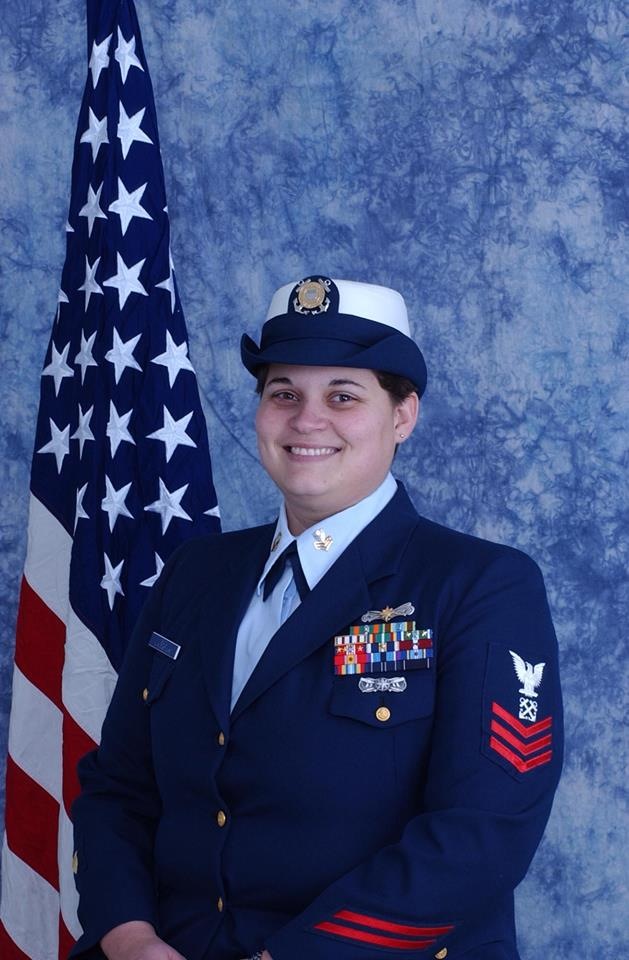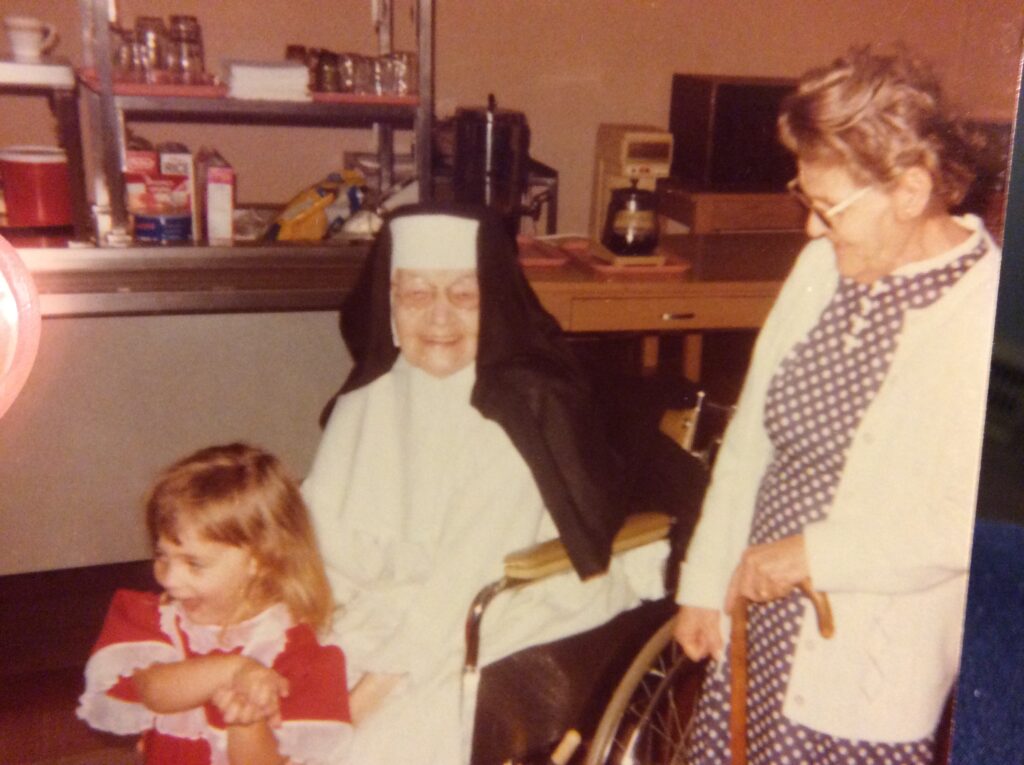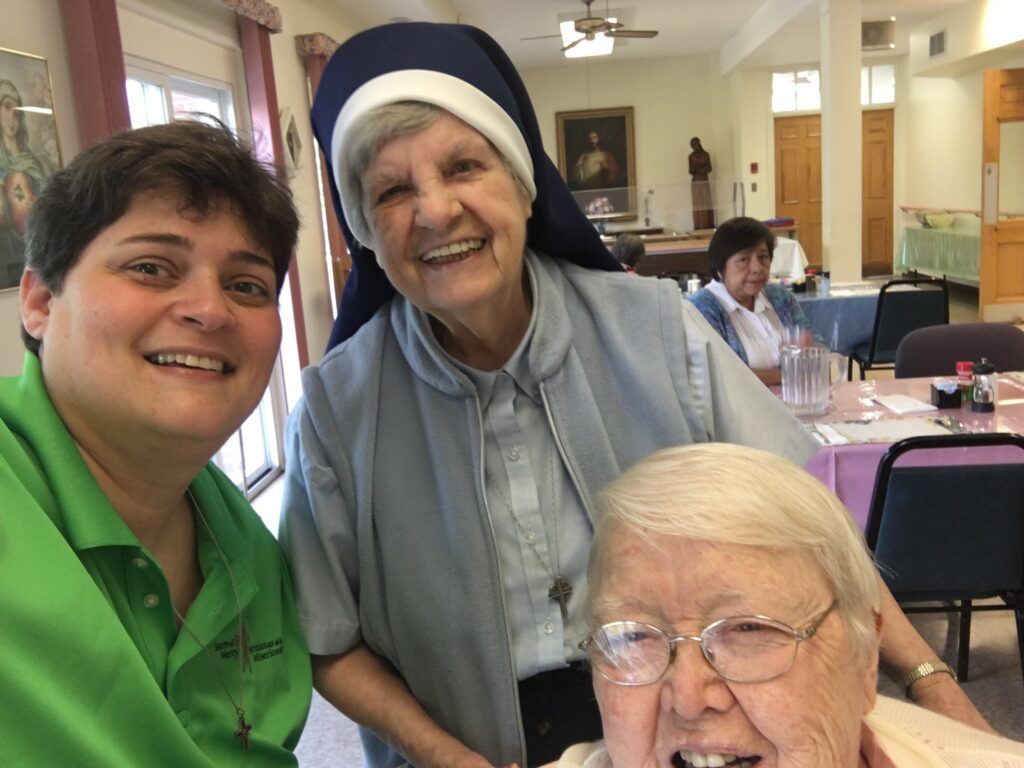By Catherine Walsh, Features Writer
The Sisters of Mercy have a storied history of serving our country. During the Civil War, Abraham Lincoln called them “veritable angels of mercy.” Sisters of Mercy also ministered in the Spanish-American War to sick and wounded soldiers. More recently, before entering religious life, sisters served in World War II, Vietnam and in non-combat times. This Veterans Day we share two of their stories: Sister Patti Baca and Sister Libby Fernandez.
Sister Patti Baca: Coast Guard Veteran
On November 11, Sisters of Mercy celebrate both Veterans Day and the death day of Catherine McAuley, their founder. “I hold both days in my heart,” says Sister Patricia Anne “Patti” Baca.
When Patti made her perpetual vows as a Sister of Mercy on May 7, 2022, she was grateful to the U.S. Coast Guard. “I believe that the Coast Guard led me to the Sisters of Mercy,” she says.
Raised in rural Texas “on a dirt road that didn’t have a name,” Patti grew up in a “money-scarce family,” she says. Her Pentecostal parents divorced, but her grandparents were a “steadying force,” especially her Catholic grandmother who had grown up in an orphanage run by sisters. “I was around religious women as a child because of my grandmother’s friendship with them,” she says.
After struggling with college and family issues, Patti joined the Coast Guard at 18 for “three hots and a cot,” she says of the bed and board it provided. “It gave me health insurance. It gave me stability.”
She found herself drawn to the Coast Guard’s opportunities for women and rose in its ranks. For years, Boatswain Mate “Bulls-Eye Baca,” as she was known due to her excellent marksmanship, worked in search and rescue missions on the Great Lakes. “I wanted to go out and contribute,” she recalls. The Coast Guard’s motto, “Semper Paratus” (“Always Ready”), appealed to her.
Center: Patti Baca, age 2, with her grandmother Ann Cunningham and Mother Leo, the superior of the Sisters of Charity of Our Lady of the Refuge in Texas
Right: Sister Patti Baca reconnected in 2019 with Sisters Mary Ann Tasker and Margaret Haley who she had first met when she was a child.
The work was intense. “You see a 50-foot wave coming at you and your whole life flashes before you,” Patti recalls. She responded to distress calls including plane crashes, diving accidents, and capsized boats as well as to drug smugglers and migrants. “Having to turn back migrants from our northern border became a dilemma for me,” she says. “I knew they had a human right to seek refuge.”
Solace from her stressful work came from attending Sunday Mass with her shipmates. “Something about the coming together and sharing of the Eucharist drew me, even though I couldn’t go to Communion because I wasn’t Catholic,” she reflects. “That hour at Mass was also a time I wasn’t at work. I knew I was safe.” At age 28, the young woman became a Catholic. Soon she found herself contemplating a call to religious life.
Patti met the Sisters of Mercy on an alternative spring break trip. Moved by their stories of service, she knew she had found the community she wanted to join. She entered Mercy in August 2013. That December, she retired from the Coast Guard after 20 years. “Hanging up my boots for the last time felt like a closing of one chapter to begin another!” Patti quips.
While in formation as a woman religious, Patti earned her master’s degree in social work. Today she ministers at the inpatient palliative care clinic at Mercy Hospital in St. Louis, Missouri. She loves her work and is quick to put patients and families at ease. When a patient apologized recently for cussing in front of her, Patti told him, “I was a sailor before I was a sister. It’s okay, no need to apologize.”
The mottos she chose to have engraved on the ring she received during her final vows profession ceremony are “Be Still and Know” and “Lean In.”
These days Sister Patti “leans in” to the Sisters of Mercy’s vow of service. “I embrace that vow,” she says. “The Sisters of Mercy stand where the problems are. We show up and help people who are most in need. It is part of my DNA—that’s what I did in the Coast Guard.”


